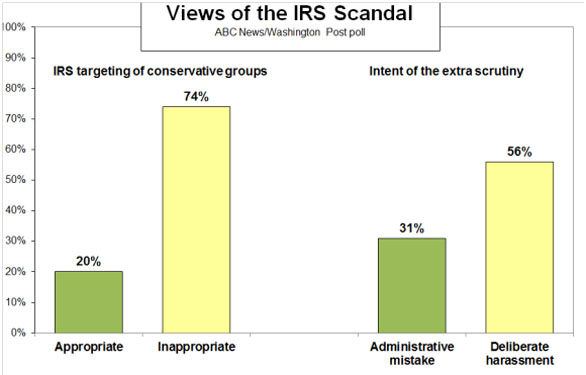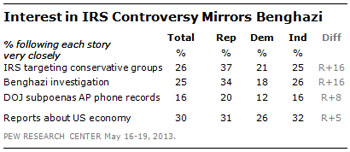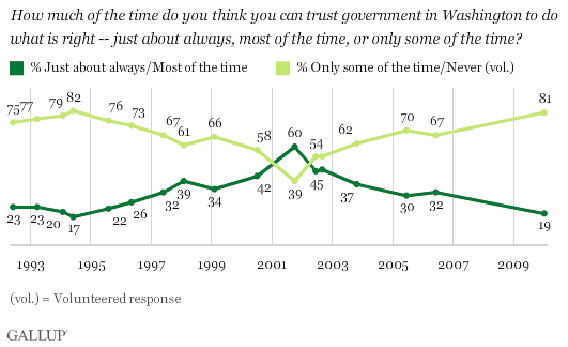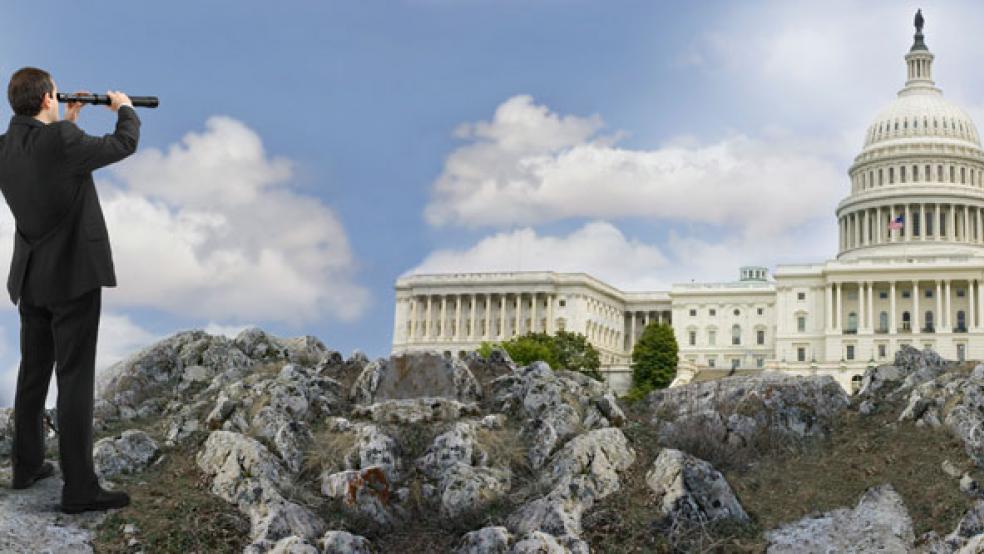President Barack Obama should be in trouble. He’s under fire from all sides: IRS officials are taking the fifth in front of Congress in response to questions about Tea Party targeting. New and damning information about the Justice Department’s targeting of reporters has emerged. And Republicans continue to insist there’s been a cover up in connection with the Benghazi attack.
According to Washington pundits, lawmakers and journalists, this evolving narrative of cover up and scandal threatens to derail Obama’s second term agenda. Some Republicans have even called for the president to be impeached.
But outside the Beltway, President Obama remains removed from any alleged wrongdoing in his administration. He’s simply brushed off the scandals: His approval rating remains high and the public has yet to associate him directly with any wrongdoing, at least so far.
In the vast majority of polls, the president’s approval ratings are still hovering around 50 percent, not a glowing review by any measure but hardly a refutation of his presidency either. And he is still trusted to handle the issues facing the country: An ABC News/Washington Post poll determined that 46 percent of Americans trust Obama, compared to 37 percent who think the Republicans would do a better job.
As neutral as they are, these polling numbers don’t back the White House’s assertion that the public does not care about the scandals that are shaping the news inside Washington. White House spokesman Jay Carney may have been in denial when he told Pierce Morgan at CNN, “You’re concocting scandals that don’t exist,” but the public has a different view. According to an ABC News/Washington Post poll, Americans are sharply critical on Benghazi, the IRS and the Justice Department overreach.

The poll released Thursday showed nearly 75 percent of Americans disapprove of the IRS’s targeting of conservative groups. And fifty-five percent believe the White House is trying to cover up facts related to the Benghazi attack in Libya last September.
Republicans aren’t likely to stop pressing these issues any time soon. Late Wednesday, Senator Marco Rubio, R-Texas, who’s been frequently mentioned as a potential GOP candidate for the White House in 2016, said that both the House and Senate should continue to hone in on the scandals currently ensnaring the administration.
“I think both the House and the Senate should be having more investigative hearings and bringing people in to testify under oath so we can get to the bottom of what happened here,” Rubio said on Fox News.
The poll numbers show the potential for these issues to catch on with the American public. But they also show that Republicans should tread carefully: The public still believes Obama is a more capable leader than the GOP lawmakers are.
A recent poll by the Pew Research Center for People and the Press found that these scandals, along with the Justice Department/AP dust up, are not actively followed by much of the public. According to Pew, “public interest in a trio of controversies connected to the Obama administration has been limited.”

As the chart shows, only a quarter of Americans are closely following the IRS scandal. The same amount are following the Benghazi investigation, while only 16 percent of Americans are interested in the Justice Department’s targeting of journalists.
CONTINUING EROSION OF TRUST
Still, the continued political drama is having some impact: It’s perpetuating an erosion of trust in Washington politicians and others that began long before this year. A March 2013 Gallup poll found distrust in government to be at the highest level since the mid-1990s.

The ABC/Washington Post poll found that this trust is continuing to dissolve. Fifty-four percent of Americans now believe the government is a threat to individual rights.
But this issue is also sharply divided between parties. Only 31 percent of Democrats believe the government is a threat, compared to 70 percent of Republicans. This issue is of concern to independents, who largely broke for Obama in the 2012 election, with 61 percent saying the government is a threat to rights.
The Republican message is reaching the base. Unless the GOP can connect these issues more directly to the president and stir interest from swing Democrats and independents, they’re simply preaching to a choir that’s in no need of conversion.





